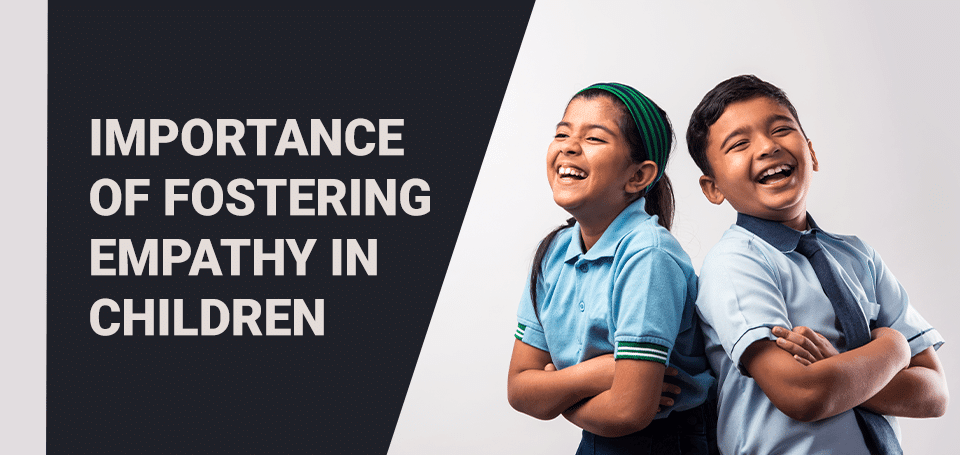Fostering Empathy in Children:
Empathy is the ability to identify closely or completely with someone else and to understand what they are feeling. Typically, young children are rather ego-centric and tend to think mostly about themselves and their immediate needs. However, developing empathy in children is an important skill, and one that will benefit them, not only in childhood but in adult life as well.
It is important to foster empathy in children because:
- It helps them become more secure and build stronger relationships with other children, their parents, and their educators.
- It positions them well for learning.
- It encourages acceptance of others and a strong sense of tolerance.
- It results in good mental health.
- It promotes social harmony and can reduce the incidence of bullying.
How to develop empathy in children
There are several ways that one can develop empathy in children. Some of them are:
- Help children develop a moral identity: A study has found that those children who were specifically praised for helping others were less likely to act generously in the future than children who were praised for being a helpful person. Parents and educators need to help children develop a moral identity and not just praise them for good deeds. Children need to see themselves as people who care and value others’ feelings.
- Help children develop another perspective: Educators suggest that rather than punishing children for speaking and acting insensitively they should be helped to respond empathetically by using the CARE model. This involves calling attention to uncaring behavior; assessing how uncaring affects others; repair the hurt and make amends and expressing disappointment for uncaring behavior. This model helps children understand another person’s perspective as well as stresses expectations for caring behavior in the future.
- Encourage the development of empathy through stories: Children should be encouraged to build their empathy muscles through play-acting, reading stories that help them get inside the minds of the characters, and watching inspiring movies. All these are activities that allow careful reflection about how others are feeling in a given situation. These build the skills for moral action.
- Support the teaching of empathy in school: Schools and teachers can teach kindness and empathy to children in several different ways. For example, one way is to set up a kindness board that lists kind acts. Another way is to use specific programs to teach cooperation and empathy on the playground and to decrease prejudice and increase caring in the classroom.
- Espouse the right values: Quite often, our system pushes children to be overly competitive, rather than kind and caring. Schools and parents often praise achievement rather than kindness and compassion, thereby sending the wrong message to children. If we want our children to develop empathy, we need to convey the right expectations to our children.
- Do not indulge in too much social media use: An excessive use of social media can prevent face-to-face encounters where empathy is born. Parents should pay more attention to how much and how often their children use social media. They should also make sure that time is balanced with more in-person conversations and an emphasis on caring.
- Help children find their inner hero: Parents and educators should encourage heroic actions in children by ensuring that they stand up to negative actions, such as school bullying. To help our children behave courageously and develop empathy we need to help them find their inner hero and encourage them to stand up for others.
- Play games that teach empathy: You can play different games that can include learning to read facial expressions and also to recognize what the different faces mean. This enhances your children’s ability to learn to read faces, which can be linked to not only developing empathy but also with several measures of success and social competence.
- Talk about feelings and emotions with your child: Not only should you talk about your child’s feelings but your own as well. The more your children are exposed to the language of feelings, the more likely are they to observe them and pay attention to their own. Also, discussing how you are feeling with your child can help a child to know what’s going on with you.
- Point out empathy in others: When you observe others practicing empathy you can point it out to your child. You do not need to lecture or drive the point home. Just a simple comment will do.
At Vikas The Concept School, we encourage our students to develop empathy for their fellow students. We model the right behavior for children to indulge in, both in and out of the classroom. We also work closely with parents to help teach children the right behavior both at home and in school. Our students blossom into empathetic and caring adults who go on to practice the value of empathy even during their adult lives.
Vikasians are known for their contribution to their communities empathetically. While they do go on to sparkling careers and achievements, they do not cease to think empathetically about those less fortunate than them. For them, empathy is not just a buzzword, but an enduring value that they practice throughout their lives.















